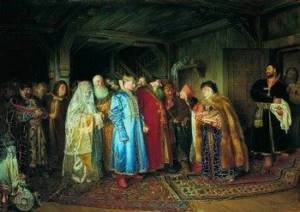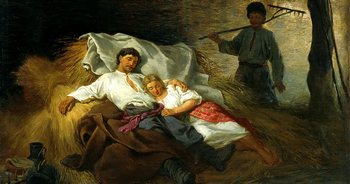In Rus' there were special traditions and customs regarding the first wedding night. In India and Africa, a man who was the head of a clan or an important feudal lord often had to take his virginity. In Rus', this was categorically forbidden.
Nevertheless, the leading role was assigned to the husband, who could only enter into sexual intimacy with his wife. All kinds of infidelity and sex with a married woman or man were considered by the people to be a terrible sin.
The night after the wedding in Rus'
Since ancient times, the time that passed after a noisy feast has been called the first wedding night. It implied not simple sexual intimacy, but the union of two people. Only the husband could exercise the right of first sexual intimacy. It was he who was considered the head of the family.
And for this he did not have to win his woman in battle, as was done in African countries. The man was initially considered the master and the so-called ruler.
Women were innocent and virginal before marriage. Subsequently, the man did not confirm this when he hung out the sheet in the morning. However, he could tell the entire village that the girl was not chaste and refuse her. In this case, the young lady suffered a real vice, which was punished not only by people, but also by church canons.
Bastard child
In no country in the world was the position of peasants enviable. Therefore, people hoped that the girl would become pregnant by the landowner. If a child was born 9 months after the wedding, the master was informed of the birth of an illegitimate son or daughter. Many nobles believed in their paternity; they generously helped the peasant family and gave money to support the child. This allowed the couple to comfortably raise other children.
In addition, some landowners sought to give their bastards a decent education, which had a positive effect on their future. Illegitimate descendants of representatives of noble Russian families even received truncated surnames of their fathers. For example, the bastard of Count Vorontsov was recorded in documents as Rontsov, the son of Prince Trubetskoy bore the surname Betskoy, the descendant of Bestuzhev - Stuzhev, etc.
Time spending
Russian wedding night.
For the Russian people, the timing of the marriage ceremony is important. It is based not only on the wedding itself, but also on the possibility of sexual intimacy. It is believed that it is unacceptable to have sex during Lent and other forbidden church days.
That is why the wedding had to be scheduled together with a church minister, who would definitely authorize this event. Very often, men guessed a woman’s cycle, because they didn’t want to just sleep on the first night. After all, a girl with menstruation is still considered sinful in church rules, so intimacy with her is impossible.
Ritual of preparation for the wedding night
Not only the newlyweds, but also their closest relatives prepared for their wedding night. The event took place in the groom's house, because it was there that the bride moved immediately after the wedding. In another way, the first closeness was called the basement, since it was located in the coolest place of the house. It was believed that it was in the cool that newlyweds had a better chance of getting closer and snuggling with each other.
The bed for the first night was necessarily made by the groom's mother or sister. This had to be done with items from the bride's dowry. At the same time, the bride was not allowed into the room until the first intimacy took place.
Unchangeable attributes were also placed on the bed. They were symbols of nobility, material well-being, health and family happiness. They were placed in the corners of the room so that they would not be conspicuous to the young married couple.
https://www.instagram.com/p/ByCtjsTjO8s/
Seeing off the newlyweds

The farewell to the bed took place with noise and dancing. It was believed that in this way all evil spirits were driven out, because they would not dare to come when there were so many cheerful and loud people.
Therefore, as soon as the procession departed from the bride’s house to the groom’s, everyone sang songs loudly and danced. Men often told obscene jokes, thereby setting the mood in the right mood.
As soon as all the people approached the house, only the groom’s close friend and the sister who made the bed could enter the room. The friend used a rod to knock out all the evil spirits and evil spirits from the bed. After which he had to pay money to the groom's sister for making the bed.
Manifestations in Europe
If in tribes and early cultures the bride was deflowered to protect her from imaginary evil, then in Europe it was the other way around. During feudalism, the owner of the land had the right to deflower the bride. Since everyone living on his territory was considered his property. Despite the morality that Christianity instilled, this right was retained by the lords throughout the Middle Ages. To be precise, until the end of the sixteenth century.
This tradition disappeared only after serfdom was abolished, since people ceased to be the property of landowners. It was thanks to this fact that the “honorable tradition” disappeared. However, for their own benefit, the landowners replaced it with ransom.
Wedding hairstyles in Greek style
Although some researchers argue that the right of the first wedding night in historical chronicles is used only figuratively, and in fact means ransom. But it is worth remembering the fact that people write history and explain it. Therefore, most authoritative researchers have no doubt that this tradition was written down as law, and its violation was very severely punished.
There is even evidence that during the Middle Ages, this tradition also took place in Russia. However, the master had to give the bride a gift for spending the night with him.
Even today, there are many sexual traditions that are quite contradictory to the prevailing morality of society.

Alone
After seeing off for the night, the noisy procession did not leave the house; it always remained near the hut. Often men would peek into the room, trying to understand what was happening. The groom's closest friend remained behind the door. From time to time he eavesdropped on what was going on behind the door, which he loudly informed everyone about.
The newlyweds initially sat down at the laid table. It was obligatory to include bread and chicken. The future spouses had to eat a little. This was necessary so that the spirits would attract good luck and family well-being to them.
After this, the man lay down on the bed, and the woman took off his shoes. Thus, the girl showed her humility and submission to her husband, the head of the family. The wife always asked her husband what mood he was in and whether she could go to bed with him. If the man agreed, then sexual intimacy began. As a rule, several acts had to take place.
A close friend of the groom overheard everything that was happening behind the door; he reported that the bride had lost her virginity. As soon as this happened, the sex ended, the young people had to go out to the guests. The celebration continued with the married couple. Further, it was believed that they were a full-fledged family. At the same time, the feast could continue both in the house of the groom and the bride.
https://youtu.be/SacG5wc_zCI
Several reasons
Researchers think that one of the root reasons for the emergence of this tradition was that the blood that is released during the loss of virginity was considered bad. In some peoples, it was believed that in this way the ancestors revealed their anger.
In other cultures, this blood was considered a love spell, so it was collected and stored in dry form. The girl was defored by experienced priests who were in the temple specifically for this purpose.
Losing virginity before marriage has occurred in different cultures. In some cases, friends or relatives of the groom, a stranger, or priests must deflower the bride. This was done in order to help the young and inexperienced groom.
Taking girls' virginity has always been considered an honorable and responsible task. In some cultures, there was even a custom for the bride to be deflowered by the most honored guest at the wedding.

Innocence as the main attribute
The virginity and chastity of the bride was considered important in the life of a young married couple. If a girl was not chaste, then shame would be brought upon her and her family. A man, at his own discretion, could return his chosen one back to her father’s house.
The chastity of the groom’s words was also confirmed by the bloody shirt. However, not in all cases the man agreed to show everyone the blood on his wife’s shirt. Therefore, he could confirm this fact only in words.
After a man and a woman had sexual intercourse, they were considered young and young. The day after the wedding, the woman was dressed in the outfit of a married lady, and the appropriate headdress was placed on her head. It was believed that this is what promises the family well-being and family happiness. Therefore, none of their young people neglected this ritual.
Defloration professional
Contrary to stereotypes, many men do not like to deprive girls of their virginity. Impressionable young men are scared away by the screams, pain, tears and bloody discharge of young beauties. The physiological aspects of the female body seem terrible to suitors. In Puritan Europe, marriages were often entered into by guys who did not have sufficient sexual experience. It was difficult for them to perform defloration both physically and mentally.
This is where professionals came to the rescue, who could “do it” with girls in the least painful way and as safely as possible, properly arousing the young lady and without damaging her fragile psyche. Needless to say, this is a task that is beyond the power of inexperienced youngsters.
It is not surprising that in 1507, when the mayor's office of the French city of Amiens passed a law obliging lords to share a bed with the wives of their vassals on their wedding night, the population reacted positively to this decision of the authorities. Defloration was perceived by many people not as a right, but as a duty of a nobleman.
Some counts and dukes had to deflower hundreds of girls a year. If the elderly lord could no longer cope with his task properly, one of his children or younger relatives took on this important function.
The origins of this custom go back centuries. In pre-Christian Europe, it was believed that only a shaman or tribal leader could perform defloration without causing the wrath of the spirits. This difficult task was handled by professionals. Echoes of pagan beliefs were strong among the people. Only the shaman was replaced by a signor or... representative of the clergy.
One day, the inhabitants of a monastery located in the Italian city of Piedmont even turned to the local bishop with a request to release them from the obligation to engage in defloration of local residents. The leadership of the Catholic Church met them halfway, replacing the existing custom with the payment of the appropriate tax.
Wedding night among Russians nowadays

Currently, there are no strict rules regarding the first wedding night. Absolutely every family is free to spend it in its own way. There are almost no couples left who get married as virgins. Most married people live together even before marriage, being in sexual intimacy.
Despite this, newlyweds try to especially celebrate and celebrate their wedding night.
That is why they often rent hotel rooms, go to warm countries, or arrange surprises for each other in the form of role-playing games.
This is a night that should be remembered for a long time. Therefore, even when two people live together for a long time, they must try and organize the night so that there is something to remember. After all, this particular night is shrouded in special romance, mystery and love.
What kind of custom?
Losing virginity in medical terms is called “defloration.” According to custom, this should happen on the first wedding night. In the Middle Ages, the right to have sexual intercourse with a bride, if she and her groom belonged to the peasant class, belonged to their master. That is, a feudal landowner whose lands are cultivated by families of young people getting married.
As a rule, it was possible to avoid fulfilling one’s duty to a nobleman only by paying a kind of “compensation.” The size and form of such a tax, collected by the master from his marrying peasants, varied depending on the country and the personal whim of the illustrious count or duke.
However, some representatives of the authorities and the clergy fought against this custom, depending on their own views. For example, back in 1486, King Ferdinand II the Catholic of Spain (1452-1516) issued a decree prohibiting noble lords from using the daughters and sons of peasants against their will “for pay or without pay,” as well as sleeping with the bride on their wedding night.
Nobody restrained the French aristocracy; the right of the first night was openly used here. Even representatives of the Catholic clergy, who often owned significant plots of land, engaged in defloration of their peasant women. And some of the nobles benefited from this, offering everyone, for a reasonable fee, to take advantage of their right to the innocence of girls.
Domestic nobles also did not lag behind their Western “colleagues”. And although, according to the laws of the Russian Empire, landowners did not have the right to the first wedding night of serf girls, many took advantage of this custom. The complete lack of rights of Russian peasants allowed the masters to do almost anything with them.
Bottom line
In Rus', perhaps, there were some of the most democratic rules for the first wedding night. It was believed that spouses should not have sex in different positions after marriage. Their only position could be missionary, where they lie facing each other. All other positions were considered unspiritual, and anal sex was especially punished by the church.
Therefore, subsequently the sexual life of the newlyweds was quite monotonous and typical, so as not to anger God and the church canons. Despite this, the Russians had their first night, and it required obligatory physical intimacy with confirmation of the bride’s chastity. Only the husband could have sexual intercourse. All other people were not allowed to see the young girl.
To avoid paying tax
However, the majority of residents of our country and Western European countries were quite happy with this custom. And one of the reasons why representatives of the lower class literally put their brides under the feudal lords was the reluctance to pay the appropriate tax.
The peasants always lived poorly; their families had no extra money. For example, the Book of Burgundian Customs (a historical document of the late 14th century) states that when marrying a girl who belonged to another nobleman, a peasant is obliged to pay his owner a ransom. The payment could be avoided by forcing one's bride to gesir soubs le seigneur, which literally means "to lie under the master."
The size of the virginity tax on the girl, which allowed her to avoid a night with the landowner, depended on his preferences. Thus, at the beginning of the 15th century, in Normandy, the groom could “buy” the right of the first night from a nobleman for 10 sous, a loin of a pig and a gallon of wine. Some peasants were sorry to part with money and provisions; they preferred to give in to the counts and dukes of their brides.
Some Russian nobles also generously gave gifts to young families, satisfying their whims. Such material assistance was very useful for people starting a life together.










